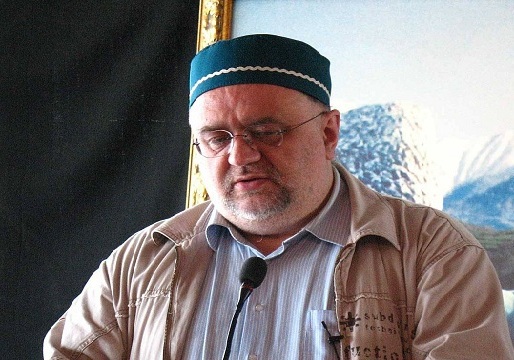
Head of World Union of Muslim Scholars Visits Dagestan
Publication: Eurasia Daily Monitor Volume: 9 Issue: 223
By:

Having failed to defeat the armed resistance, the Dagestani authorities decided to look for help by finding favorable interpretations of Sharia law among foreign scholars. The republican authorities certainly received official consent from Moscow for their quest abroad (https://russian.irib.ir/radioislam/2010-08-31-12-33-40/2010-09-09-08-01-11/item/156021-%D0%B2). Their efforts resulted in the condemnation of Salafism by some foreign Islamic scholars, which was a fairly significant achievement for the local political elite (https://chechnya.gov.ru/page.php?r=126&id=11197).
The authorities never stopped looking for the right person to declare a fatwa on jihad in the North Caucasus. Ali-Vyacheslav Polosin, a former Christian Orthodox priest who converted to Islam, energetically worked toward this goal and became the new face of Islam in Russia. On his initiative, it was decided to invite Sheikh Karadagi, the secretary general of the World Union of Muslim Scholars, to Dagestan. The republic’s official clerics must have been convinced that they could cast the situation in the republic to the visitor in a favorable light and that Karadagi, being uninformed about the real situation, would provide them with the right fatwa (https://mahachkala.bezformata.ru/listnews/delegatciya-vsemirnogo-soyuza-musulmanskih/7845274/). All possible steps were taken to avoid having any guests at the meeting with Karadagi who were in opposition to Dagestan’s official clergy (www.ng.ru/regions/2012-11-26/3_kartblansh.html).
Still, several people opposed to the official Muslim Spiritual Board of Dagestan managed to sneak into the meeting with Karadagi and ask him several questions. Sheikh Karadagi stated that “one of the primary causes of extremism is terrorism on the part of the authorities.” The sheikh also stated that public calls to use Sharia not only have nothing to do with extremism, but are an obligation every Muslim has, according to the unanimous opinion of all Muslim scholars. The sheikh noted that such a call should be made in a wise manner and Sharia implementation should be gradual (www.checheninfo.ru/15225-dlya-chego-priehal-v-dagestan-sheyh-al-karadagi.html). When he was asked about the war on hijabs in Dagestan, Sheikh Karadagi did not know what to say, admitting that he had not known about it. The sheikh must have been taken aback because he did not realize he was associating himself with those who consider the hijab unwanted and not obligatory, while in Islam this issue is not even debatable (https://musulmanin.com/suri-024-nur.html). The fact that his recommendations on jihad had not been included in the final draft of the resolution from the international conference of Muslim scholars held in May was the second revelation to the sheikh. The third came when he learned that some people in Russia interpreted the resolution as a fatwa. The fourth surprise for Sheikh Karadagi was that the official clerics in Dagestan regard the Islamic scholar al-Taimiya, a Salafi, as detrimental to the republican Islamic community, while Sheikh Karadagi noted that he often made use of the works of Taimiya, who is a well-known and revered scholar throughout the Islamic world.
On November 17, at the conclusion of the conference in Dagestan, a resolution was adopted that defines Dagestan not as a territory of war (dar al-harb), but as a territory of Islam (dar al-islam). This move is very interesting in the context of the confrontation between the militants and the authorities. For the first time, the status of the Republic of Dagestan was defined by an Islamic scholar from a theological perspective not as a territory of war but a territory where the Islamic majority lives in peace, enjoys religious freedom and performs the necessary religious rites. The same applies to other republics and regions where the Muslim majority lives in safety and enjoys religious freedom. The document says that it is unacceptable to launch military actions against Muslims or non-Muslims who have made a peace agreement with Muslims, since there is no basis in Sharia for such acts (www.chechen.org/forums/showthread.php?t=494&p=23322#post23322). So having been convinced by the governmental authorities and official Muslim clergy that there are no restrictions and constraints on Muslims in Russia, Sheikh Karadagi announced his fairly weak decision, which contradicts reality and renders the decision a poor tool for convincing the population (https://kavpolit.com/kto-tolkaet-dagestan-v-propast/). Ali Polosin and the Dagestani official clerics changed the original, skewing it to their advantage. In the original Arabic text of Karadagi’s decision, the document is described as an act, but it was translated into Russian as a fatwa. By raising this document’s status to the level of a fatwa, the Russian authorities revealed the true purpose of the visit (www.riadagestan.ru/news/2012/11/30/147116/).
The reaction to this was not uniform, even among the Sufi sheikhs. Some of them did not like that an Arab sheikh outsider had adopted a fatwa about their home country (www.riadagestan.ru/news/2012/12/1/147189/). Others hoped that the opinion of such an authoritative sheikh would help to calm the situation in the republic by influencing young people (www.riadagestan.ru/news/2012/11/30/147139). Still others thought that Sheikh Karadagi’s visit changed nothing, especially since the sheikh himself stated in Makhachkala that he had not issued any fatwas (https://dagestan.kavkaz-uzel.ru/articles/216440/).
In any case, Sheikh Karadagi is not an authority for the militants to listen to. This means that the sheikh’s visit was not arranged for the sake of the militants. Rather, the government was trying to disorganize and mislead those Muslims who are still in doubt by trying to make them recognize the religious authority of a foreign sheikh. Karadagi’s declaration about Dagestan being the territory of Islam and peace should not be overestimated. The official Islamic clerics are themselves at the core of the problem, since they blindly support every move of the government. Until they realize that this link between the authorities and the clerics discredits them and results in young people abandoning Sufism to support the jihadists, there will be little progress in reducing violence. So Sheikh Karadagi’s visit is unlikely to change anything in Dagestan or the North Caucasus as a whole.




